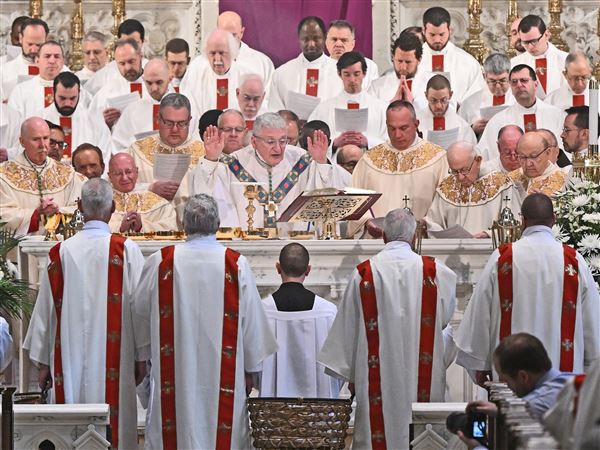The August Wilson Center for African American Culture apparently will be put up for sale.
Judge Lawrence O'Toole of Allegheny County Common Pleas Orphans' Court issued an order Monday that allows a court-appointed conservator to sell the Downtown building to pay off a $7 million mortgage and other outstanding debt, stating he found "no other reasonable or cognizable option."
In doing so, the judge rejected a request by prominent Pittsburgh attorney E.J. Strassburger to serve as a new conservator on a voluntary basis in one last bid to save the near-broke center, named after the famous playwright who grew up in the Hill District.
"I'm very disappointed. There is a huge amount of public support, and I think there is a huge amount of pent-up foundation support. With the right pieces in place, we could have energized and moved the center to the place it should be in the community. I don't see it the way the judge saw it, but some of us wear robes and some of us wear suits," Mr. Strassburger said.
At a hearing Friday, he argued that conservator Judith Fitzgerald had used the wrong methods to garner financial support. He said one of the flaws with her approach was not having a plan to take to donors. He believed he could use his influence and relationships in the community to build support for the center.
With more than 40 years of experience, Mr. Strassburger, president of the Strassburger McKenna Gutnick & Gefsky law firm, has specialized in complex commercial litigation, municipal law and appellate practice. He currently is representing the city of Pittsburgh in its lawsuit challenging UPMC's tax-exempt status and also serves as president of the American Civil Liberties Union of Greater Pittsburgh.
Mr. Strassburger said he did not know whether he would continue to pursue a possible rescue in light of the judge's decision.
"There is a lot of positive energy. We're going to consider our options and hopefully figure out a way to save the center. It's worth saving," Mr. Strassburger said, noting that he received lots of calls and emails over the weekend from people supportive of his effort.
"I'm more convinced than ever that there is the energy and that there's a real possibility of saving the center, but the judge didn't agree with that," he said.
In an interview after the decision, Ms. Fitzgerald said that she expects to be in a position to have a buyer identified for the sale of the $40 million building within the next 60 days. Under Monday's order, she cannot sell the real estate without court approval.
At the same time, Ms. Fitzgerald stressed that the go-ahead on the liquidation did not preclude a savior stepping forward with a plan to save the center, which opened in 2009.
"I will listen to any and all reasonable proposals. If the African-American community or whoever comes up with something that works or makes sense under the circumstances, I'm going to consider everything," she said. "If there's a way the community can rally to keep the center here, I hope that somebody will come up with that kind of plan."
Beverly Weiss Manne, attorney for Ms. Fitzgerald, cautioned that any new plan would have to be "well thought out" and viable.
"They have to resolve all the issues. It can't be a kick-the-can-down-the-road plan. That's been the problem with the center the last few years," she said.
In an interim report released last week, Ms. Fitzgerald said that she saw "simply no possibility of continued viability of" the center given its debt and the lack of operating support and revenue.
In her testimony in court Friday, the former U.S. bankruptcy judge said that "not a single person or entity" had stepped forward with either a plan to save the center or money to help.
Ms. Fitzgerald said she has been rebuffed by major local foundations, which have been financially supportive of the center in the past. Without enough support to pay its operating expenses or debt service, it can't survive, she said. She has estimated the center's accumulated debt at up to $10 million.
Nonetheless, she has said that her first choice in a buyer is someone interested in keeping the center as a cultural institution. While she has received no formal offers on the building, she has confidentiality agreements with a number of organizations, though she has declined to identify them.
Allegheny County Executive Rich Fitzgerald has said that he and Pittsburgh Mayor Bill Peduto have been trying to craft a plan to rescue the center, which was designed to celebrate African-American culture in Pittsburgh and throughout the country. Mr. Fitzgerald, no relation to the conservator, could not be reached for comment Monday night.
In response to Monday's court order, Eric Schaffer, attorney for Dollar Bank, said, "We appreciate that Judge O'Toole gave this a lot of attention and we look forward to working with the parties in interest."
Under Monday's court order, Dollar Bank, the mortgage holder that moved to foreclose after the center defaulted on its payments last year, must continue to fund expenses such as utilities and maintenance at the building through June 30.
First Published: January 27, 2014, 10:00 p.m.
Updated: January 28, 2014, 5:02 a.m.














